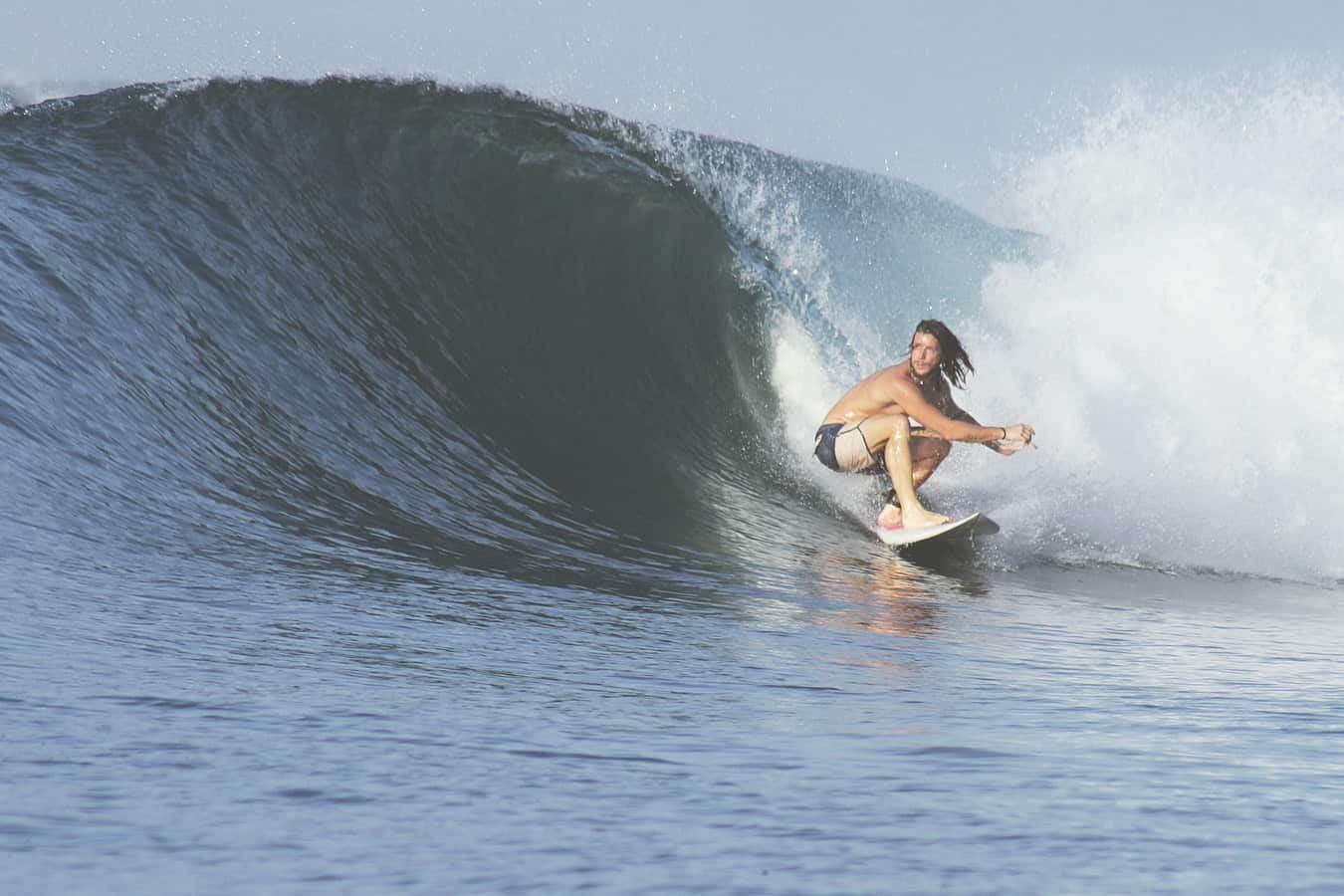As a surfer, you spend a lot of time in the ocean, it’s all just part of the sport. The ocean can be an amazing and healing place, between the waves, the peacefulness and even the creatures we share it with.
But with all its pros, when you spend a lot of time in the ocean you might notice some physical effects on your body, like your hair.
So are there also cons to spending so much time in the ocean? Is saltwater bad for your hair? The answer is two-part. While saltwater has benefits for your scalp, it can wreak havoc with your hair itself.
The ocean is filled with good minerals like magnesium, potassium and sulfur along with salt. These minerals are good for the skin on your scalp, helping to promote healthy hair growth.
Thanks to the salt, it also provides some exfoliation by helping to remove excessive oil buildup and dead skin cells from your scalp. In these ways, ocean water helps your hair by helping the skin your hair grows from.
However, your hair itself doesn’t enjoy the same benefits. Salt leaches moisture, and it does this to your hair.
Going in the water once or twice won’t do much harm, but consistently spending time in the ocean, like in surfing, will definitely dry out and damage your hair without proper care.
But, since you’re not likely to quit surfing due to damaged hair, there are solutions and ways to keep your hair healthy.
How the Ocean Harms Your Hair
Salt absorbs water from its surroundings, so, when it’s on your hair, it absorbs the water out of your hair.
Your hair is made of a hardened protein called keratin and this keratin needs water in order to stay flexible and maintain elasticity.
When you spend a lot of time in the ocean, the salt sucks up the water and therefore the moisture in your hair.
This leaves it feeling dry and dull, but also affects its elasticity. Without the ability to stretch and bend, your hair becomes brittle and more prone to breakage.
The inside structure of your hair is protected by a cuticle, which is basically tightly packed shingles that hold everything in. Salt water roughs up this cuticle, again leaving hair feeling rough, tangled and dry.
So ocean water is hard on your hair by sucking up its moisture and roughing up your cuticle.
Infrequent ocean swims aren’t that big of a deal as there’s minimal moisture loss that can be made up. Consistent time in the saltwater though, will lead to tangly, dry hair with lots of breakage.
If you have colored or bleached hair, these effects are intensified. On colored hair, the cuticle and internal structure have already been chemically damaged and are therefore more vulnerable to saltwater.
For colored hair, this means the cuticle will lift quickly and the artificial color will bleed out, leading to greater fade. On bleached hair, this means toners, especially ashy tones, will be gone in a surf session.
On top of faded toners, bleached hair is already dry hair thanks to the chemical process involved. So even one swim will see more breakage than usual.
Over time saltwater also builds up on the hair. This buildup causes the hair at the scalp to become limp and more oily, while the mids and ends tend to clump together.
Saltwater buildup also creates a barrier on the hair shaft, preventing products from working. The result being hair that is dry on the inside with wasted product on the outside.
Luckily, you can prevent and mitigate the effects of ocean water on your hair.

Taking Care of Your Hair At the Beach
You may not be able to prevent the ocean from causing moisture loss while you’re surfing, but there are some things you can do when you go out that will help.
First, give your hair a fresh water rinse before heading in. This will allow your hair to absorb and fill up with freshwater, lessening the effects of saltwater.
Freshwater will still cause some fading of artificial colors, but is otherwise not harmful to your hair. Next, douse your hair with a leave in conditioner, or even a regular conditioner or hair oil.
Conditioners will give your hair extra moisture as well as a protective barrier from the saltwater. Hair oil acts as a sealant, giving your hair a protective coating.
If your beach doesn’t have showers, you can do this step on dry hair as well. Damp fresh water hair is best though as you won’t need to use as much product to fully coat and cover your hair.
Be generous when applying conditioner, especially through the mids and ends of the hair as these are usually already dry.
Don’t leave your hair loose while out on the water. In addition to the drawbacks of salt, wet hair in general is weak. The stretch of hair when it’s dry is doubled and sometimes tripled when wet. But like a rubber band this means it can snap more easily.
To help prevent this, wear your hair in a protective style before heading out into the surf. The easiest styles are braids or a bun. A single braid or simple bun will keep your hair out of the way while keeping it protected.
Be sure to keep styles on the loose side and use fabric covered hair ties to prevent overstretching and breakage.
On that note, don’t attempt to comb out or brush your hair after being in the ocean. Between the salt and the weak state of your hair when wet, you’ll be in for a tangled mess of broken hairs.
Taking Care of Your Hair At Home
Taking care of your hair when surfing is only half the answer of keeping it healthy while spending lots of time in the ocean. The second half is your at home care.
To keep your hair looking and feeling good you need a hair care routine that will help negate the effects of all the saltwater.
Firstly, shampoo as soon as you can after surfing. Try not to let the ocean water dry into your hair as this will intensify it’s negative effects.
When you go to wash your hair, start by adding a clarifying shampoo to the mix. Clarifying shampoos act as exfoliators to your hair, removing excess oils, product buildup and most importantly, mineral deposits on the hair.
These shampoos are very strong though and shouldn’t be used every time you wash. Depending on how often you surf, you should use them about once a week.
Their strength also makes them more drying than regular shampoo, so they aren’t meant for everyday use.
Neutrogena’s Anti-Residue Shampoo is a great inexpensive option for serious degunking. R&Co’s Oblivion Shampoo is perfect for a non drying clarifier.
On the days that you clarify, do a double shampoo. Once with your clarifier and once with a shampoo labelled for moisture.
This will help make sure your hair is free of build up and debris while the moisturizing shampoo will help replace some of what your hair has lost.
On days that you don’t clarify, stick with your moisturizing shampoo. Be sure your scalp has been thoroughly scrubbed and your shampoo fully rinsed to avoid any leftover residue.
After you clarify, use a deep conditioning hair mask to replenish your moisture loss. Start at the mids moving through the ends and use what’s left on your hands near the roots.
The hair closest to the scalp is strongest and most prone to oiliness while the mids and ends are more dry and fragile.
Use your hair mask once a week when you clarify. You can use a mask more often, but watch out as too much can cause product buildup and limp, greasy hair, especially if your hair is on the more fine or thin side.
Great masks to try are Oribe’s Gold Lust Hair Masque and Evo’s The Great Hydrator. Both will leave your hair feeling soft and full of bounce and shine.
After shampoo and conditioner, use a moisturizing leave-in conditioner or primer to finish your routine. It can even be the same one you use at the beach.
Shampoo and conditioner prep the hair to get it ready to receive products. The clarifier or shampoo removes debris and build up that may block the efficacy of your products, while the conditioner balances ph and helps lay down the cuticle.
Then your leave in is like using lotion after your shower. It’s the finishing touch, leaving your hair moisturized and free from any drying salt.
The last step is combing out your hair. Apply product from mids to ends before attempting to comb out your hair to help with the process.
Go for a wide toothed comb or wet brush. Stay away from anything with boar hair or tightly packed bristles.
Again, your hair is weaker when wet so you want to avoid pulling and yanking if you can. Start detangling from the bottom up, making sure to be gentle when hitting snags.
If your hair isn’t overly tangled, you can also just leave it after applying your products and brush it out once it’s dry.
This will prevent overstretching and leave your hair with natural waves.
Following these steps will help reverse the damage ocean water can cause to your hair, leaving you free to enjoy the water as much as you want.
Related Questions
Does Saltwater Make Your Hair Curly?
Saltwater brings out waves and curls in the hair. Although salt is drying to the hair, it can add texture and volume as well.
With the cuticle layer open, when salt enters and dries, it leaves little fibers that add volume and encourage curls to form. This is why surfing or swimming in the ocean creates beachy waves.
So saltwater will increase the wave or curl you already have, but it won’t make your hair curl if it’s naturally straight.
Do I Need to Worry About Ocean Water if My Hair is Short?
If you wear your hair very short in a barber cut, and it’s not colored or bleached, you don’t have to worry as much about the effects of saltwater.
If your hair is within 1 – 4 inches long, there isn’t enough to worry seriously about breakage, unless your hair is colored and therefore already compromised.
If your hair is very short and uncolored though, you should still clarify and deep condition your hair to keep it healthy, but may not need leave in conditioner before going into the water.

